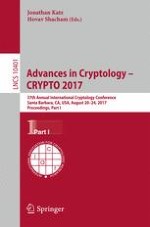2017 | OriginalPaper | Chapter
Bitcoin as a Transaction Ledger: A Composable Treatment
Authors : Christian Badertscher, Ueli Maurer, Daniel Tschudi, Vassilis Zikas
Published in: Advances in Cryptology – CRYPTO 2017
Publisher: Springer International Publishing
Activate our intelligent search to find suitable subject content or patents.
Select sections of text to find matching patents with Artificial Intelligence. powered by
Select sections of text to find additional relevant content using AI-assisted search. powered by
